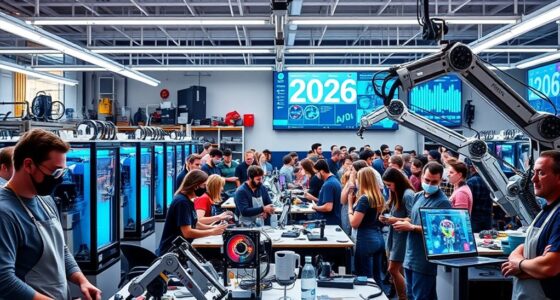Silicon Valley is leading nationwide efforts to fund and expand AI education for teachers. Through initiatives like the Silicon Valley Artificial Intelligence Project (SVAIP), they provide training and resources to help educators integrate AI into classrooms. Partnerships with tech giants and unions boost these efforts, aiming to prepare teachers for the evolving landscape. If you continue exploring, you’ll discover how these investments are shaping the future of education nationwide.
Key Takeaways
- Silicon Valley invests heavily in AI education initiatives like the SVAIP, starting in 2025 to train teachers nationwide.
- The SVAIP, led by the Krause Center, includes summits and programs to equip educators with AI tools and classroom integration skills.
- Broader national efforts, such as the Arm EducateAI Coalition, expand AI literacy from K–12 to higher education with resources and credentialing.
- Corporate partnerships with Microsoft, OpenAI, and unions fund workshops and tools to help teachers incorporate AI in classrooms.
- These combined initiatives aim to prepare millions of teachers and students for an AI-driven future across the United States.

Silicon Valley is investing heavily in AI education for teachers to prepare them for the rapidly evolving classroom landscape. Major initiatives like the Silicon Valley Artificial Intelligence Project (SVAIP) exemplify this commitment. Starting in 2025, this five-year program by the Krause Center for Innovation aims to equip educators with AI tools and guidance, ensuring they can integrate AI effectively into their teaching practices. The goal is to prepare students for the changing job market by fostering an advanced, AI-savvy teaching workforce. Recognizing that many teachers see AI’s potential but lack the necessary resources and training, SVAIP hosts summits scheduled for November 14 and May 8, 2025, which are designed to engage and train educators across the country. These gatherings serve as crucial opportunities to build confidence and competence in AI, ultimately transforming classroom experiences. These events also aim to foster collaboration among educators to share best practices and develop innovative approaches to AI integration. Additionally, ongoing research highlights the importance of teacher professional development in successfully implementing AI tools, emphasizing the need for sustained support beyond initial training.
Alongside SVAIP, the Arm EducateAI Coalition is working to expand AI education nationwide. This coalition offers a range of learning pathways from K–12 to higher education, covering foundational to advanced AI topics. They provide teachers with basic AI training, practical tools, classroom kits, and credentialing programs, aiming for scalable, sustained impact. Leadership development initiatives target school administrators, empowering them to implement AI curricula system-wide. These efforts are designed to reach millions of students over time, ensuring AI literacy becomes a core component of education.
Big tech companies like Microsoft, OpenAI, and Anthropic are investing millions to support AI teacher training through partnerships with teachers’ unions, including the American Federation of Teachers. Their workshops demonstrate AI applications such as grading automation and lesson creation tools, helping teachers stay relevant amid rapid technological change. These collaborations also give tech firms access to schools, influencing future AI workforce development.
Surveys reveal that 96% of teachers believe AI will be essential in education within a decade, yet 58% haven’t received any AI training. Teachers primarily use AI for personalized learning and data insights but remain concerned about issues like plagiarism, misinformation, and reduced student interaction. Despite these concerns, only 5% fear job loss, showing cautious optimism about AI’s role. Programs like UC Santa Cruz’s modular courses and startups like Brisk Teaching leverage generative AI to support teachers, addressing the growing demand for AI literacy in the modern classroom.
Frequently Asked Questions
How Will the Program Be Funded Long-Term?
You can expect the program to be funded long-term through a mix of public and private sources. Private companies, especially those with CSR initiatives, will likely continue providing core funding, while government grants and incentives may supplement this support. Strategic partnerships and sustained impact metrics will attract ongoing investments. This blended approach guarantees the program remains scalable, adaptable, and aligned with national education and AI literacy goals over time.
What Specific AI Tools Will Teachers Learn?
You’ll learn to use AI tools like Afficient Academy for personalized learning, automated grading systems for quick feedback, and natural language processing for analyzing student work. You’ll also explore large language models like ChatGPT for lesson planning, multimedia content creation, and curriculum customization. Plus, you’ll gain skills in AI literacy through microcredential programs, helping you incorporate AI ethically and effectively into your teaching practices.
Are There Eligibility Requirements for Participating Teachers?
Yes, there are eligibility requirements for participating teachers. You generally need to be affiliated with an educational institution and interested in integrating AI into your teaching. Programs often accept teachers at various skill levels, from beginners to advanced. You might also need to align your curriculum with AI-infused content or earn continuing education credits. Some initiatives may require open enrollment, while others might have specific application processes.
How Will Student Privacy Be Protected During AI Training?
Think of student privacy as the shield of Achilles—you must protect it fiercely. During AI training, data is safeguarded by strict federal laws like FERPA and COPPA, which restrict PII use and require parental consent. Schools implement secure data handling practices, de-identify information, and vet AI providers to prevent misuse. Teachers should follow protocols and stay informed, ensuring student data remains confidential and protected throughout AI development and deployment.
Will There Be Ongoing Support After Initial Training?
Yes, there will be ongoing support after initial training. You’ll have access to microcredential programs, online resources, and community events that keep your skills sharp and updated. Partnerships with learning platforms offer reusable curriculum materials, while regular summits and peer networks foster continuous learning. Additionally, workforce training opportunities and formal certification programs guarantee you stay current with AI advancements, empowering you to integrate AI effectively and confidently in your teaching practice.
Conclusion
As you read about Silicon Valley’s efforts to fund AI education for teachers nationwide, it feels like a fortunate coincidence that innovation and opportunity are converging just when they’re needed most. This unexpected connection could transform classrooms across the country, empowering teachers with new tools and inspiring students to reach higher. Sometimes, the most unlikely alliances spark the greatest change, reminding you that progress often comes when effort and luck unexpectedly meet.










